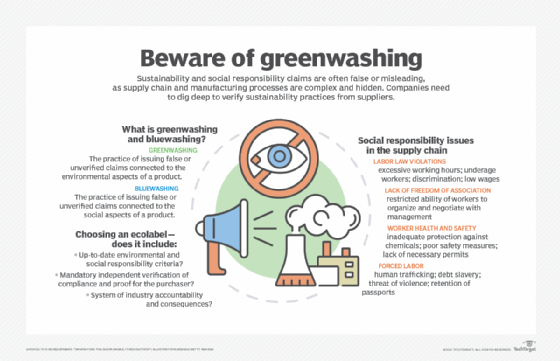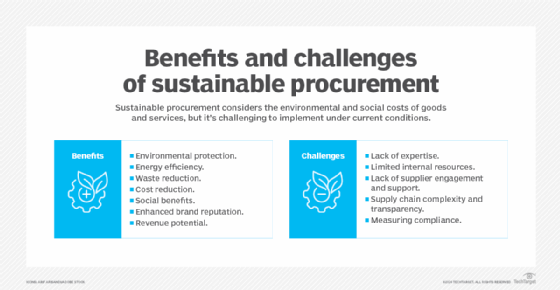
How to avoid greenwashing as a marketer
Greenwashing can erode customer trust and damage a brand's reputation. To avoid it, organizations can offer evidence to support their claims and earn sustainability certifications.
Since the mid-2000s, consumers have shown increased interest in environmental sustainability. In response, many organizations have adopted sustainability-focused products, services and marketing campaigns.
Sustainability initiatives can help organizations stand out in competitive marketplaces and simultaneously demonstrate corporate social responsibility. However, brands sometimes exaggerate their sustainability efforts or knowingly develop marketing strategies to exploit consumers' interest in the environment. Marketers might create deceptive campaigns to make the brand appear sustainable when it has done little to reduce its environmental footprint. This is known as greenwashing, and it can damage brands' reputations.
To avoid greenwashing, marketers should consider the following tips:
- Support marketing claims with credible evidence.
- Be transparent.
- Set clear goals.
- Consider the overall environmental footprint.
- Follow sustainability certifications and standards.
- Audit supply chains.
- Monitor customer perception.
- Collaborate with sustainability experts.
The ability to recognize and avoid greenwashing offers marketers a competitive advantage as it helps them promote sustainability initiatives safely and effectively.
8 tips to avoid greenwashing
Marketing teams can use the following tips to avoid greenwashing:
1. Support marketing claims with credible evidence
False or unsubstantiated marketing claims about an organization's environmental practices can result in significant fines and reputational damage. For example, an organization that describes itself as carbon neutral -- meaning it has completely negated its carbon footprint with offsets -- should collect and use data points and third-party research to support this claim. This evidence can legally protect the organization if any marketing claims come into question.
2. Be transparent
Transparency builds trust with stakeholders and helps marketers avoid the perception of greenwashing. Marketers should clearly communicate their brand's environmental achievements and areas where the organization can improve. Disclosing challenges, trade-offs and limitations in sustainability efforts demonstrates authenticity and helps manage customers' expectations.
Transparency also extends to the data sources, partnerships and methodologies organizations use to measure their sustainability efforts. It enables customers to make informed decisions based on accurate and verifiable information.

3. Set clear goals
Marketers should establish measurable goals for sustainability to track the brand's progress and maintain accountability. Vague or overly ambitious claims that lack clear timelines or metrics create skepticism and increase the risk of greenwashing accusations.
Sustainability goals should align with recognized frameworks, such as Science Based Targets Initiative or the UN Sustainable Development Goals. They should also include benchmarks for emissions reductions, resource efficiency or net-zero targets -- commitments where organizations plan to remove the same amount of greenhouse gas emissions as they release. Communicating these goals publicly reinforces credibility and encourages long-term commitment to the organization's initiatives.
4. Consider the overall environmental footprint
Organizations with large carbon footprints that advertise minor sustainability efforts risk accusations of greenwashing. For instance, an oil company that powers its offices with renewable energy shouldn't market itself as eco-friendly simply because it made one small aspect of its operations more sustainable.
Instead, organizations must consider the overall effect their activities have on the environment. In marketing materials, marketing teams can use data points to demonstrate how the products, sourcing, manufacturing and distribution have offset or reduced the company's carbon footprint.
5. Follow sustainability certifications and standards
Sustainability certifications, such as those from LEED, B Corp and Fair Trade USA, offer an independent third-party assessment of an organization's operations. These certifications can let customers know an organization has taken steps to minimize its environmental footprint, including sustainable construction, waste management and supplier sourcing.
6. Audit supply chains
Organizations should investigate their suppliers' sustainability practices before they build relationships with them. An organization can do everything on its end correctly, but if its suppliers engage in unsustainable practices, people might still accuse that organization of false advertising. The audit process can help businesses maintain transparency throughout product lifecycles and reduce potential instances of greenwashing from external parties.

7. Monitor customer perception
Customers' perceptions of brands can change over time. Organizations can use ongoing surveys and interactions to continuously gauge how customers feel about their sustainable messaging and products.
To avoid greenwashing, organizations should make honest efforts to minimize their overall environmental footprint and back up marketing claims with data. These practices can help companies build customer trust and establish themselves as environmental leaders in their respective industries.
8. Collaborate with sustainability experts
Organizations can partner with environmental scientists, sustainability consultants and industry groups to improve the accuracy of their marketing claims. These experts can offer best practices, assess environmental effects across supply chains and align messaging with current standards and regulations.
Collaboration with experts also demonstrates a genuine effort to improve sustainability strategies and reduce the risk of unintentional misinformation. It helps organizations make informed decisions and elevate the credibility of their eco-friendly initiatives.
What is greenwashing?
Greenwashing is a form of deceptive marketing that makes an organization's products seem more environmentally sustainable -- or "greener" -- than they are. It comes from the word whitewashing, which implies a cover-up of negative information. Organizations that greenwash might make false claims about their products, services or practices to appear more sustainable.
This approach can damage a brand's reputation because it undermines consumer trust and can cause lasting harm. With increased climate awareness, regulatory scrutiny and stakeholder activism, misleading claims about eco-friendly initiatives can result in legal penalties and public backlash. To avoid greenwashing, organizations must make honest efforts to reduce their environmental footprint and accurately portray their operations and corporate initiatives in marketing materials.
How does greenwashing harm organizations?
Consumers increasingly care about environmental issues and corporate social responsibility, so companies might feel pressure to prove their commitment to sustainability. However, deception or misdirection through greenwashing can lead to a wave of criticism from customers and other stakeholders who might feel the organization cheated or betrayed them. This backlash can quickly spread on social media and damage an organization's reputation.
Greenwashing also puts organizations at risk for legal repercussions. False claims about environmental responsibility can deceive customers and violate consumer protection laws in many countries. Regulatory bodies in regions such as the U.S., EU and Asia-Pacific have increased enforcement of consumer protection and environmental marketing laws.
Organizations that make false or exaggerated claims can face large fines and other penalties from regulators, as well as lawsuits from consumers who claim a brand misled them. The financial costs associated with legal action can devastate organizations -- especially those already struggling financially due to economic downturns or other factors.
When economic downturns hit, organizations that face greenwashing accusations might struggle to reestablish customer trust and recoup losses from fines and decreased business. To recover from these accusations, organizations can invest in positive PR, change how they obtain resources and market themselves, and make charitable donations.
Editor's note: This article was updated to reflect changes in sustainable marketing best practices.
Griffin LaFleur is a MarketingOps and RevOps professional working for Swing Education. Throughout his career, LaFleur has also worked at agencies and independently as a B2B sales and marketing consultant.






